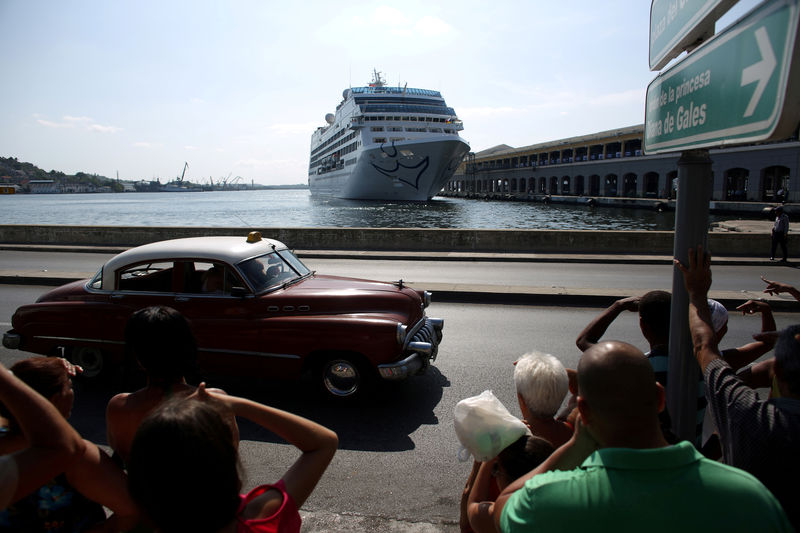By Sarah Marsh and Nelson Acosta
HAVANA (Reuters) - Cruise line Carnival (NYSE:CCL) Corp is asking a U.S. court to dismiss lawsuits that claim the company profited from confiscated Cuban property, the first such cases brought since the Trump administration made them possible this month.
Two U.S. citizens who claim to hold titles to the Havana and Santiago de Cuba ports that were nationalized by Cuba after Fidel Castro's 1959 leftist revolution filed suits against Carnival in U.S. District Court in Florida in early May for docking there.
That came after the Trump administration announced a long dormant and controversial section of the 1996 Helms-Burton Act would take effect on May 2, allowing U.S. citizens to sue Cuban entities and foreign firms over confiscated Cuban property.
The law is part of a broader attempt by the United States to pressure Cuba over its support for Venezuela's embattled government by taking aim at Havana's beleaguered economy.
Cuba sought to reassure foreign investors at an event in Havana on Friday, saying only four lawsuits had been filed so far, despite the United States saying there could be hundreds of thousands. The European Union and Canada have said they will use blocking legislation to protect their companies.
"Helms-Burton has no application here," according to a filing in the case by Carnival on Thursday. "First, by its own terms, trafficking under Helms-Burton does not include uses of property 'incident to lawful travel to Cuba'."
These cases could set a precedent, especially in the travel industry. Some lawyers like Carnival's say the travel exemption should shield U.S. cruise lines and airlines doing business with Cuba under licenses granted by former President Barack Obama during the two countries' brief 2014-2016 detente.
But U.S. courts could determine the travel they facilitate is tourism and violates the decades-old U.S. trade embargo on Cuba.
"The fulcrum for determining the outcome of all travel-related lawsuits will be whether there has been tourism," said John Kavulich, president of the U.S.-Cuba Trade and Economic Council Inc.
Carnival also disputed the ownership of the two U.S. citizens who are descendants of original owners. Their lawyers did not immediately reply to requests for comment.
Increased U.S. hostility, more than Helms-Burton, is affecting foreign companies operating in Cuba, said Xulio Fontecha, head of the Association of Spanish Businesses in Cuba (AEEC), at the event in Havana.
Banks in Panama and Costa Rica had closed the accounts of some customers in recent months and courier services were declining to send documents to Cuba, he said.
"The problem goes far beyond Title III, which we condemn of course," he said, referring to the section of the Helms-Burton Act that permits the lawsuits.
Some Spanish companies also received a letter from a group in Florida warning them of potentially being complicit in violations of human and labor rights, he said.
The ambassador of the European Union, Alberto Navarro, said the bloc would continue to seek to expand business with Cuba, defying the U.S. hostility.

He encouraged Cuban reforms to make the island more attractive to foreign investors and offset disincentives created by the Trump administration policy.